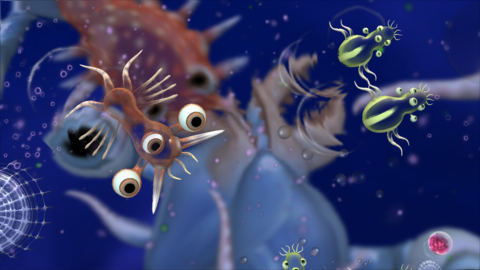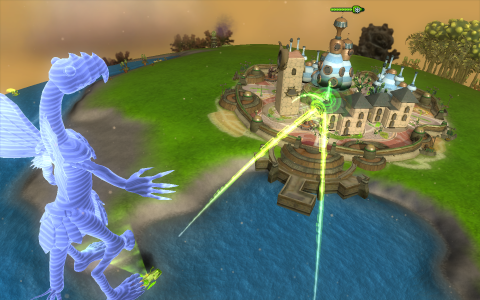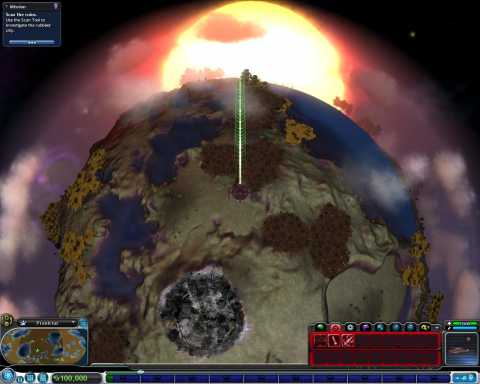
Spore is a game where you sometimes guide and other times merely witness the entire development of a species, from its earliest single-celled origin to its triumphant exploration of the cosmos. So much has been written about and expected of Spore--its promise to connect millions of players through their creative impulses; its importance as the latest offspring of Will Wright's prodigious intellect; its ability to get kids excited about science again--it's easy to forget that, after all, Spore is just a game.
It's more like five short games, actually, most of which aren't strong enough in pure gameplay terms to stand on their own. Luckily, they don't really have to, since the five phases--cell, creature, tribe, civilization, and space--are unified by a single, believable focus on the evolutionary path--first biological, then cultural and technological--of the species that you create and influence. Spore makes it so easy to shape your creation's appearance, abilities, and behaviors that I couldn't help getting really caught up in governing every aspect, every eye stalk, every planetary colony of my species' journey, from start to finish. The game also does a great job of seamlessly integrating the fruits of other players' creativity into your own game. Even before Spore's official release, I started noticing--and then hunting, domesticating, or battling--other players' species with regularity.
The game has some unique strengths. Its creation tools are marvelously easy to use, letting you stretch, squish, position, resize, and recolor body parts with a few simple clicks and drags of the mouse. A quick look at the diversity in the official Spore site's database will show you just how powerful these tools are. Later on, you spend just as much time designing various kinds of buildings, land vehicles, and spaceships, and the game does a respectable job of making your design choices contribute to the functions and behavior of the animal or machine. The integrated Sporepedia browser makes it fast and easy to peruse the community's creations, too, of which there are already several million only a few days after launch. That's a lot of creatures to play with.

Spore also harnessed my own wide-eyed fascination with physical existence and the scientific enterprises that reveal its nature. The game doesn't stray far from what's believable--no creatures shooting fireballs or anything. Instead, Spore includes headier academic concepts--in a very limited, cartoon-like fashion--such as panspermia, predator/prey dynamics, and the roles that forces like religion and commerce can play in the development of societies.

Spore's most positive traits are so uniquely satisfying that it's disappointing the gameplay which underpins them isn't more engrossing. In the early developmental stages, you mostly click repeatedly on your food sources, pausing occasionally to guide the next generation of your species' biological evolution. The tribal and civilization phases get a bit deeper as you go--they introduce elements of cultural interaction that let you guide your budding society's affinity for things like militarism, commerce, and religion. The gameplay starts to resemble real-time strategy more and more with each phase, but even in the fourth stage (civilization), I felt like the intellectual concepts were working on a higher level than the gameplay that was driving them.
Only the final space phase feels like a fully realized game, where you can while away hours building your galactic empire through trade, exploration, or conquest. Space is Spore's real meat, the final mode which is more involved and time-consuming than all four of the other phases combined. Those phases are necessary, though, since your decisions throughout each step of the game contribute to the abilities and behavior of your society at the peak of its development. A single, inspiring timeline of your species' entire development from single cell to rocket ship illustrates the choices you've made throughout the billions of years the game covers.

Your prosperity on the galactic scene stands on the edge of a knife in the space phase, though, and you have to be extra careful not to piss off too many other species. I made some poor diplomatic decisions early on and paid for it dearly as two enemy empires took turns overtaking all my colonies and then pounding the hell out of my home world, as I scrambled for hours to build up enough cash to buy them off. Your enjoyment of this mode will definitely benefit from experience and repeated playthroughs, and though you can start a game in any of the five phases with a new creature whenever you want, I wish I could have also restarted the space phase with my evolved species and all the choices I'd made for it up to that time.
I feel like Spore hasn't really gotten a fair shake. Its coming was built up by its pedigree, by the media and its own publisher, and by years of delays into the sort of mammoth event that no piece of pop entertainment could live up to or should have to endure. All of the game's pieces may not be perfect, but combine them with Spore's originality and unique bent, with all the things it gets right, and you may find there's a pretty darn good, thought-provoking game in here, after all.